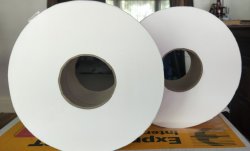......
What I do wish is that there was a non threatening way to identify households that had panic bought large quantities. I don't wish anything bad on them in any way but at some point if the government simply nationalises those households and converts them into supermarkets and the people who live there have to now work in their own supermarket.. particularly if they were rude or aggressive to supermarket staff as they took their 3 trolleys of stuff out to the car.. that would be justice of some sort.....
ja1, I respectfully think that your feelings are misdirected here. I will explain my thinking:
We as a society have enjoyed a truly wonderful era of peace and affluence. Especially here in Australia, life has been a very stable thing. We have become accustomed to the ability to pop out on a whim and buy anything we fancy, and also to run our households on zero reserves as the supply of goodies from the supermarket has been so amazingly reliable.
Given this general stability, all businesses have striven to become as efficient (and profitable) as they can. In the area of supermarkets and so forth this means they have found ways using technology to make their logistics chains super-efficient, and run on essentially zero-margin in the actual stores. As I have posted elsewhere, I think there is a fundamental lack of understanding by consumers as to what their local woolies looks like behind the scenes - the belief appears to be widely held that "out the back" there is a big warehouse that they use to stock up the shelves with. This is simply not the case! Pretty much all supermarkets and most other businesses literally only keep on hand the stuff you see on the shelves themselves - anything "out the back" is essentially just the stock that has arrived in the last few hours that hasn't yet been moved to the shelves. They can do this as with fancy modern tech automatic orders for stocks can be made instantly based on sales that day, and within seconds a warehouse further away can start to load a truck to send it. And when that warehouse sends stock out, likewise an order goes back to the warehouse behind that one....
Products such as toilet paper are an extremely stable item in the sense of how much product is used by the population on a daily basis. So all the way back in the logistics chain, they can minimize any excess that needs to be stored and rehandled (which increases costs). And behind the whole logistics chain, the manufacturers can likewise restrict their production to a minimal and precise rate, to also save costs. This is overall an extremely efficient way of doing things.
BUT, it is a system where there is simply no capacity to respond to any sudden spike in demand.
A month or so ago, a few people decided to buy some extra toilet paper. Not because they are evil hoarders or panic buyers, but they were quite sensibly thinking that they should get some extra in case they had to self-isolate. So really they should be commended in their public spirit. This tiny spike in demand instantly made a few shelves light, which spooked the next lot - those who became the "panic buyers". And I do not blame them either. For their whole lives they have been accustomed to wandering down to the local supermarket and buying a couple of rolls every so often. Even though good old dunny paper is a really important item in households, people have never needed to have any margin (stock) held at home. So when one day they casually go to get some and there is none, they freak out. So the next day when there is some product, they decide to grab some extra rolls "in case" they will miss out next time. This creates a bigger surge in demand, and suddenly the whole supply chain is unable to meet the spike in demand, and everyone starts panic buying, making the whole thing worse.
I believe what is happening (specific to loo paper) is that now many people have had their beautiful faith in toilet-paper supply burst. So everyone is trying to build a household stockpile, or buffer. I think the loo paper thing will only settle once the suppliers and supermarkets have finally managed to produce an extra amount so that everyone now has their stash, and production can return to the normal levels.
I think the same principals apply to all the other products, from pasta to tinned tomatoes. It is a perfectly decent and sane thing to have a store of these things in your home, especially in times of uncertainty of ability to freely move around and shop.
So, IMHO, rather than blame "panic shoppers", we perhaps should take a look at ourselves as a society and ask questions as to how we have let ourselves become so safe and secure that we risk living without margins....
EDIT: additional comment - just look at modern houses. It seems everyone has to have a media room, etc, but the pantry is tiny....
















